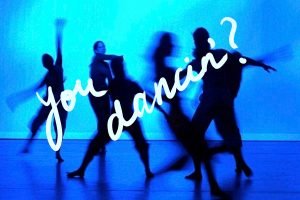
It’s Friday evening and I am crawling through the traffic on Hills Road in Cambridge. Around me I see people, lots of people, all rushing somewhere and I wonder if they are happy. At the red light I want to leap from the car and take hold of one particularly harried and weary looking woman and say, “Come with me and in an hour you will be dancing with joy.”
I am on my way to St Paul’s Primary School Hall, where Alex Svoboda, a charismatic Russian man, is teaching Freedom Dance. I am greeted with hugs by three thirty-something women who are taking our money at the door and around them are piles of coats, clothes, and shoes. Behind them the school hall is subtly lit and packed with people. There are white heads and dreadlocks, farmers and nurses, artists, hippies, business people and students, people of all ages and sizes, and they are listening to Alex who invites us to, “open to the music”.
For thousands of years people have left the grind of work behind them to meet under the stars and the trees or around fires where they would hold hands in a circle and sing songs to begin the dancing, spinning and whirling faster and faster until a climactic sense of unity and bliss was found. This exhilaration and ecstatic emotion was seen by the celebrants as a direct experience of the Divine, and was particularly attractive to working people. Inevitably it drew the disapproval of the civic and religious authorities, who had no control over this unruly and ungovernable behaviour.
This deeply human and instinctive activity was stamped out around the 17th century when worship became mediated by Priests, who lined up the worshippers in front of him, in straight wooden pews. In spite of this suppression, dance kept bursting out all over the place in carnivals and festivals but now, having been separated from the Divine presence it became experienced as a purely hedonistic activity.
Tonight as I join with sixty or seventy other people, I am about to experience a mystical state, not one mediated by religion or therapy but by this lovely Russian with excellent taste in music. Dancing is not some special ability, gifted to only a few people who have skills, it belongs to every human being who is prepared to let go and give themselves to the music and the dance.
When describing their experiences people use words like, home, healing, self acceptance, no judgement, a return to who I really am, or as a discovery that you’ve got a second, third, fourth and fifth gear of perception, when all you have ever accessed before is first gear. In neurological terms, our brain waves on a day to day basis are dominated by beta waves (problem solving, cognitive) but we can tune into our alpha waves (awareness and power of now) and delta and theta waves (creative and transcendent) through intentional activities like meditation and freestyle dancing.
The music flows and sometimes we dance alone, moving around and between each other, sometimes we hook up in twos and threes to dance together. It is exciting, exhilarating and often very funny, and comical. Alex skilfully blends one track with the next, building and building the rhythm and pulse until it reaches a heart thumping crescendo where we all let go in utter abandonment and an incredible high. This shared experience can often create a deep release in the dancer and it is not unusual to see people in a silent embrace while one weeps silently into the sweat soaked clothing of another. With this shared intensity of experience it is hardly surprising that real friendships are made and a supportive community grows up around the dance.
The dancers come from many back-grounds and life experiences and there is no dogma here. From my own Christian perspective I see myself as a creation or expression of the Divine who wants to dance with me in an ecstatic and direct experience of worship and joy. For others it is a cathartic release from a week of stress or anxiety at work, and there are those who just love to dance. When the music ends a dozen or so of us decamp to the local pub, famished and thirsty. From our table gales of laughter billow around the room and I notice envious glances being sent in our direction.
Medical research shows that dancing has huge health benefits. It is a great cardiovascular work out and according to the New England Journal of Medicine, “dancing dramatically reduces the occurrence of dementia and Alzheimer’s disease. But not just any dancing will do. Freestyle dancing requires constant split-second, rapid-fire decision making which is the key to maintaining intelligence because it forces your brain to regularly rewire its neural pathways….Frequent freestyle dancing was shown by the study to reduce the risk of dementia by 76 percent, twice as much as reading and playing sports or practising choreographed dance sequences which had no benefit at all.”
So leave your inhibitions behind, get into some loose clothes, grab a friend and find the dance. They are not exclusive and although you might have to travel to a town or city, I am certain you won’t regret it. On the Internet search for “5 Rhythms Dance” or look here “www.5rhythms.com/EventSearch.php
(Linda Richardson)
